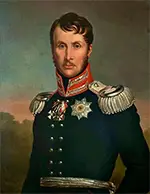Frederick William III: King of Prussia
Frederick William III was King of Prussia and Elector of Brandenburg for more than 40 years in the late 18th Century and early 19th Century. 
He was born on Aug. 3, 1770, in Potsdam. His father was the eventual King of Prussia Frederick William II, and his mother was Frederica Louisa of Hesse-Darmstadt. As the oldest son, young Frederick William was expected to succeed his father, who became king in 1786. By that time, the boy had been studying under tutors, at times living at Paretz, and had gone undergone military training. He fought against France in the War of the First Coalition. On Dec. 24, 1793, Frederick William married Louise of Mecklenburg-Strelitz. Unlike many former rulers, this royal couple enjoyed each other's company. They 10 children together, seven of whom lived into adulthood: Frederick William (1795), William (1797), Charlotte (1798), Charles (1801), Alexandrine (1803), Louise (1808), and Albert (1809). King Frederick William II died on Nov. 16, 1797, and his son succeeded him as king. The new ruler made his mark right away by dismissing his father's ministers and personally taking on the responsibilities of many of them. He also cut many royal expenses. Prussia had left the war against France by signing a treaty, in 1795. Frederick William kept out of the continual fray until 1806, when he joined the Third Coalition in fighting what was by then imperial France. Frederick William himself took charge of the army. The significant French victories at Jena and Auerstädt devastated the Prussian war machine. French troops later occupied Berlin, and Frederick William agreed to the Treaty of Tilsit, again taking the once proud Prussians out of the fighting. The terms of that treaty were particularly harsh toward Prussia, despite the personal protestations of Queen Louise to the French emperor, Napoleon Bonaparte. Under French occupation, Prussia rebuilt, to a degree. A group of ministers completed some reforms of the government and the military. But Prussian stayed out of the war until 1813, when, seeing Napoleon's retreat from Russia, Frederick William abandoned his treaty promise and joined the Allied force again, traveling with the main army as it rolled back French advances and played a vital role in the victory at Waterloo in 1815. Those efforts resulted in Prussia's gaining territory as a result of the Congress of Vienna. Prussia was at peace for a time, and the king turned his focus inward again. He had made vague promises of delivering a constitutional form of government but ultimately abandoned those. He also achieved full state control over Prussia churches, after merging the Calvinist and Lutheran churches into the United Church of Prussia. Queen Louis had died in 1810. In 1824, Frederick William married again, to Countess August von Harrach, Princess of Liegnitz. They had no children. King Frederick William III died of a fever on June 7, 1840, in Berlin. His son then became King Frederick William IV. |
|
Social Studies for Kids
copyright 2002–2024
David White




